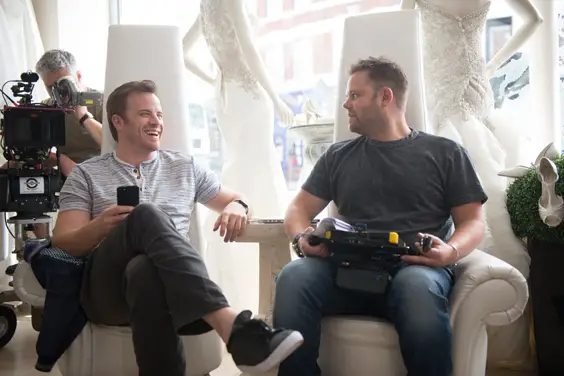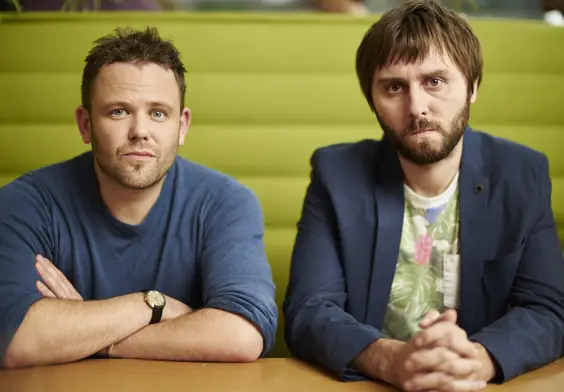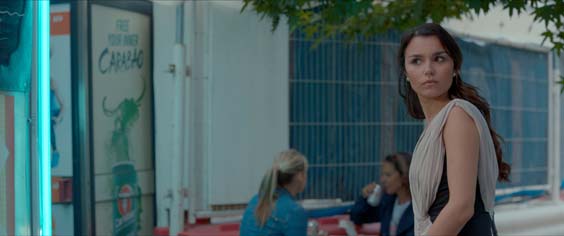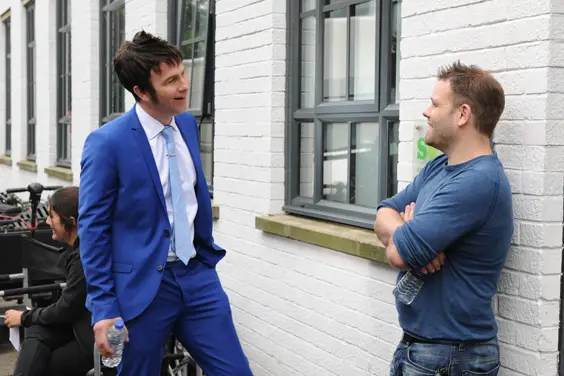An Interview with Mark Murphy, Film Director
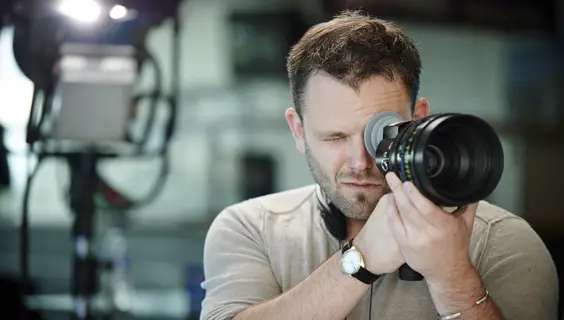
By Roger Crow
Writer/director Mark Murphy trained in Yorkshire before returning to the region to make projects such as Awaiting and End of Term. Ahead of the release of his new movie, The Revenger: An Unromantic Comedy, I spoke to him about getting a foot on the film-making ladder, working in the region, and his top tips for surviving in the industry…
How did you get your break in the film business?
It was after leaving film school in ’96. I’d been back home a few days and I bumped into the father of a couple of my friends (Michael Nicholson). He casually mentioned, as you do, that they were making a film out of his book, based on him, starring Woody Harrelson, Marisa Tomei and Stephen Dillane, directed by Michael Winterbottom. It was called Welcome to Sarajevo. He was the ITN war correspondent and followed the true tale of how he rescued an orphaned child from the war and snuck her back into the UK, under the guise that she was his daughter.
Anyway, even though they were just starting the final week of filming, he very kindly put in a call to the producer and got me the opportunity to jump on board as a work experience runner. Whilst this in turn isn’t exactly an enormous break, being a runner on a feature, it did give me the opportunity to make a few contacts, in particular, the film’s producer, Graham Broadbent, who generously gave me plenty of advice and a database of production companies to hound for further work. It was also my first experience on a film set, and it was incredible.
“Momentum”
My first break as a director can probably be split between two moments: the first when a friend of mine offered to invest £20,000 into a TV docudrama I wanted to make on Casanova; he never did put the money in (fortunately for him), but the belief that he was going to gave me the impetus and momentum to raise further monies. In the end I think we shot it on £650k. It starred Patrick Bergin and Armand Assante. They were terrific. The project was awful.
My first break into film happened when an acquaintance got in touch and asked what I was up to. I knew he was interested in putting a small sum of money into film, so I told him I was half way through a script that I thought he’d love, but I didn’t have any money. He told me if he liked it, he’d invest. I didn’t have anything. Seven days later I sent him a script and he invested. Since then I’ve been lucky enough to do one film a year, all co-produced with Yorkshire-based GSP (aka Goldfinch) Studios.
“Cutting your teeth”
What’s been the biggest hurdle you’ve overcome as a filmmaker?
Getting a film made; keeping positive for 15 years and finding a way to earn a living without taking my eyes off the goal. It’s important to keep one foot in the industry at all times; it’s incredibly difficult to leave the industry with aspirations to earn enough money to subsidise yourself through the film making years, and then to return to it, I’ve seen so many colleagues leave and never come back. Unless you went to a great film school and got picked up by a commercial or promo production house, the only other ways of cutting your teeth as a director, are:
Climb the long arduous ladder, by starting at the bottom and eventually working your way up, or… Take that leap of faith, raise the money and shoot your own short or low budget project. There is of course a third way: be stinking rich in the first place (or sleep with someone else who is), and then just throw money at your vanity project. In either case, I’d recommend getting a couple of years at the very least on set and film school.
“Yorkshire’s got fantastic landscapes”
You’ve juggled comedy and horror over the past few years. Any plans to mix the two genres?
There’s a huge part of me that never wants to return to horror. That being said, I do have a couple of horror/comedy scripts that I’ve written. I won’t elaborate here for fear of someone running off with one or both ideas, but let’s just say it’s entirely possible.
Why do you like filming in Yorkshire?
I went to a film school in Yorkshire back in the mid-nineties; it left a lasting impression. Yorkshire’s a beautiful part of Britain, and York is a striking and magical city. In a case of pure serendipity, the producer with whom I shot so many films, Alan Latham, bought the very film school I studied at. Sadly, when the founder, John Sichel passed away in 2005, the school closed down. I ended up shooting two of my films (Awaiting and End of Term) at the studios.
As a film setting, Yorkshire’s got fantastic landscapes, both historic, pastoral, rural and urban. During the summer you also get a lot more daylight, which is hugely helpful, and a magic hour (that moment when the sun is setting and the sky lights up in various hues) that lasts forever.
“Morale boost”
If you had five tips for aspiring filmmakers, what would they be?
I’m going to answer this under the banner of ‘five cliched maxims’. My mentor, John, when I was studying loved using them, especially “Necessity is the mother of invention.” If nothing else, it makes it more colourful.
No man is an island. Get support and work with others. Making a film is like a military campaign, and there are hundreds if not thousands of aspects that need scrutiny and attention. No matter how broad your shoulders, don’t take on all the burden yourself; find like-minded film makers and work together. Beyond the pressure it will alleviate, it’s also a huge morale boost when you collaborate with others, so much more can be achieved. Whilst I’m not suggesting film making by committee, having objective feedback can be tremendously helpful.
“If anything can go wrong it will”
Necessity is the mother of invention. Use your disadvantages to your advantage. No money? Use one location and a smaller cast. Be prudent with your shots; how are you going to tell your story in an efficient but entertaining way?; How are you going to keep the pace tight? For all disadvantages, find a creative solution, and use it to make the film better. Use the minimalism to create tension and drama.
If anything can go wrong it will. My namesake’s law, and key to successful film making is to anticipate problems, and more importantly take confidence in dealing with them, and deal with them quickly. The best film makers are problem-solvers. Every day on a film set something will go wrong, I promise. Quite often it will be something stupid, but problematic nonetheless. Have backups of everything that you can (afford to have) on set, or available at short notice. Don’t be afraid to make tough decisions. The most precious thing you have on a film set is time. Don’t waste it compounding mistakes.
“A film is only a film if people see it”
Time is money. Don’t be frivolous with your shots; get what you need and make sure you’ve got coverage, and leave yourself enough time to get the the rest of the scenes. Relying on pickups will be costly and more complex.
It’s not over until the fat lady sings. The film can be dramatically improved in post (production), so treat the edit as a creative process, not a mechanical one. And when you finally lock off, remember: a film is only a film if people see it. From the moment you start filming to the point it’s released, do everything in your power to build a fan base. Remember there are two times in a film’s life cycle when it has an interest value: 1) Whilst it’s being shot, and 2) Just before it’s released. Build a fan base, and you’re in with a chance a distributor’s going to want to get it out there.
And finally I’d like to add a bonus piece of advice. Don’t be a d*ck. A film crew is a family, treat them like one. If you look after them, they will work twice as hard, and support your passion. It’s a privilege shooting a film; remind yourself of that every day. You’re not saving lives, you’re living the dream.
